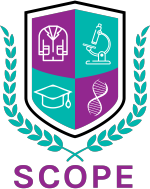
The medical field continually evolves, with laboratory services as a cornerstone of diagnostics and research. Among the various courses that prepare professionals in this area, the Diploma in Medical Laboratory Technology (DMLT) is notable for its comprehensive approach and practical orientation. This article will explore the DMLT course details, syllabus, eligibility, and more, specifically highlighting the offerings at Scope College, a premier government-affiliated institution.
DMLT Full Form
The full form of DMLT is Diploma in Medical Laboratory Technology, a course that trains professionals to perform essential medical lab tests crucial for diagnosing and treating diseases.
DMLT Course Details
The DMLT course details a comprehensive curriculum aimed at training competent medical laboratory technicians. This two-year diploma program encompasses various aspects of medical laboratory technology, including microbiology, clinical chemistry, hematology, and immunology. It is designed for students with a 10th or 12th-grade education, focusing on imparting both practical skills and theoretical knowledge essential for diagnostics and disease prevention.
DMLT Course Duration
The DMLT course is a two-year diploma program designed for students who have completed either the 10th or 12th grade from any stream. It prepares students for technical roles in medical laboratories, focusing on both the practical and theoretical aspects of laboratory technology.DMLT Eligibility CriteriaThe DMLT course eligibility requires applicants to have completed their 10th or 12th grade from any stream, and it is also accessible to students who may have failed in the 10th grade. This inclusivity ensures that a wide range of students has the opportunity to pursue a career in medical laboratory technology, preparing them for important roles in healthcare diagnostics and research.
DMLT curriculum
The DMLT curriculum is structured to provide comprehensive training in medical laboratory technologies, covering various subjects necessary for the diagnosis and management of diseases. Key areas include microbiology, hematology, clinical pathology, and immunology, along with practical training in handling modern laboratory equipment and technologies. This diverse syllabus prepares students to perform and interpret laboratory tests critical in medical diagnostics and treatments.
DMLT Syllabus
Microbiology: This subject involves the study of microorganisms such as bacteria, viruses, fungi, and parasites. Students learn about their roles in health, disease, and the environment, and how to identify and control infectious diseases.
Hematology: Focuses on the study of blood, blood-forming organs, and blood diseases. Topics include the analysis of blood cells, the diagnosis of blood disorders like anemia and leukemia, and the management of blood health.
Blood Banking: Covers the collection, typing, testing, and storage of blood used for transfusions. It includes learning about the compatibility of blood types and the safe handling of blood products.
Immunology: Students learn about the immune system and its response to pathogens or foreign substances. This includes understanding how the body defends itself against disease and the basis of immunological techniques used in the lab.
Clinical Pathology:: Involves the chemical analysis of body fluids like blood and urine. Students learn to perform tests that measure enzyme levels, hormones, and other biochemical markers critical for diagnosing diseases.
Histotechnology: Involves preparing and studying tissue samples under a microscope to diagnose diseases. Techniques include staining and slicing tissues to identify pathological conditions.Each of these subjects equips students with specific skills needed to operate effectively in medical laboratories and contribute to patient care and research.
Scope of DMLT
The scope of the DMLT (Diploma in Medical Laboratory Technology) course is extensive, preparing students for a wide range of careers in the healthcare sector. Graduates can find employment opportunities in government and private hospitals, diagnostic laboratories, blood banks, and research institutions. With the healthcare industry expanding, the demand for skilled laboratory technicians is on the rise, ensuring promising career prospects and competitive salaries for DMLT graduates. For a more detailed understanding of career opportunities after completing a DMLT course, please visit the course page here.
DMLT Salary
The starting salary for DMLT professionals in India typically ranges from INR 2,00,000 to INR 4,50,000 per year. This reflects the demand for skilled personnel in medical laboratory technology, ensuring a stable and promising career path in various healthcare settings. For more detailed information on the “DMLT salary in India,” you can visit the course page here.
Why Choose Scope College for DMLT?
Choosing Scope College for the DMLT program offers several advantages, including access to experienced educators and state-of-the-art laboratory facilities. The college’s curriculum is carefully designed to meet industry standards, preparing students for successful careers in medical laboratory technology. For those interested in DMLT admission, Scope College offers a clear and informative process to guide prospective students on how to get admission in the DMLT course. If you’re ready to advance your career, you can enroll now or contact us to discuss your educational options and explore more about the program at Scope College.
Career Opportunities After Pursuing DMLT
After pursuing a DMLT, several career opportunities await in various sectors of healthcare:
- Biomedical Laboratories: Work in labs conducting vital diagnostic tests and research projects.
- Private, Government, or Corporate Hospitals: Join hospital laboratories to perform and analyze tests essential for patient care.
- Medical Colleges: Assist in educational roles, conducting research and supporting medical education.
- Diagnostic Laboratories: Operate and manage lab tests crucial for disease diagnosis and monitoring.
- Setup Your Own Lab: Start and manage your diagnostic laboratory business.
- Work as Tutor/Lecturer: Teach and train future medical laboratory technicians, sharing your expertise.
These paths offer a stable and rewarding career in medical laboratory technology, ensuring diverse job roles and growth opportunities.
Conclusion
The DMLT course is a gateway to a rewarding career in medical laboratory technology, offering extensive training in essential diagnostic skills. From understanding microbiology and hematology to gaining practical experience with advanced lab techniques, the curriculum is designed to prepare students for various roles in healthcare. With numerous career opportunities and the potential for significant professional growth, pursuing a DMLT is a valuable investment in your future. Consider Scope College for its exceptional program and supportive learning environment. Ready to start your journey? Enroll now or contact us for more information.
Frequently Asked Questions
What is the work of a DMLT?
A DMLT professional performs essential diagnostic tests in medical laboratories. Their work includes analyzing bodily fluids, tissues, and cells to detect diseases, monitoring patient health, and assisting doctors in diagnosing medical conditions. They are skilled in using various laboratory equipment and techniques to ensure accurate test results.
Is DMLT hard to study?
The difficulty of studying DMLT varies depending on an individual’s aptitude for science and practical laboratory work. The course involves learning detailed theoretical concepts in microbiology, hematology, and clinical chemistry, as well as hands-on training with laboratory equipment. With dedication and a strong interest in medical science, students can manage the coursework effectively.
Does DMLT require NEET?
No, the DMLT course does not require NEET (National Eligibility cum Entrance Test).
Is DMLT in demand?
Yes, DMLT professionals are in high demand due to the growing healthcare industry. Medical laboratories play a crucial role in diagnostics and disease prevention, increasing the need for skilled laboratory technicians. This demand ensures good career prospects and job stability for those who pursue a DMLT course.
